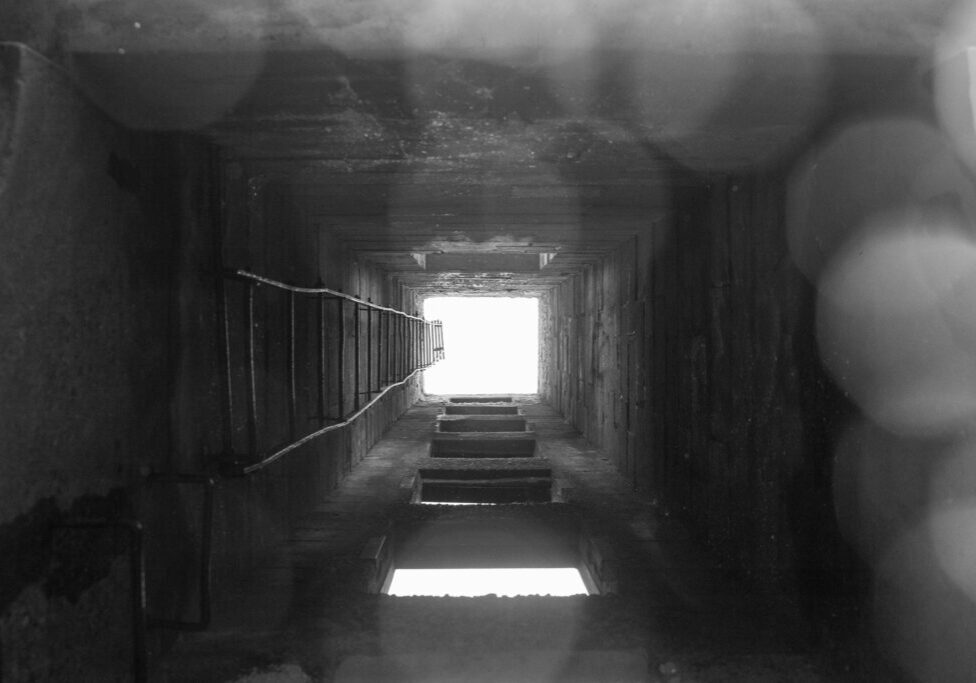The Dark Room of Winter’s Despair

The moon is no door. It is a face in its own right,
White as a knuckle and terribly upset.
It drags the sea after it like a dark crime; it is quiet
With the O-gape of complete despair. I live here.
Twice on Sunday, the bells startle the sky —
Eight great tongues affirming the Resurrection
At the end, they soberly bong out their names.The yew tree points up, it has a Gothic shape.
Sylvia Plath, “The Moon and the Yew Tree”
The eyes lift after it and find the moon.
The moon is my mother. She is not sweet like Mary.
Humanity has always been fascinated with the moon and its curious power. We’ve gone well out of our way to set foot on its surface, to study it, and have spent fortunes of money and time just looking at it from afar. Wallace and Gromit even made a brave voyage to the moon to attain a lifetime supply of cheese in the late 1980s (A Grand Day Out was a childhood favorite of mine).
Something almost 240,000 miles away from us has a profound influence on our home. It orbits around us, using its gravitational pull to drag and push oceans, causing tides to rise and fall. It holds an emotional magnetism, like a siren’s song. As nature ebbs with a sweet melancholy, the moon almost personifies the Earth, changing her mood and temperament a little differently every day.
Somehow the human experience reflects the flow of creation – the constant change of seasons and friendships, the predictability of the sunrise coexisting with the inconsistency of the day ahead, treasuring and mourning the fact that every moment is unique and can never be exactly replicated.
In the process of self-examination, we must observe the influences outside ourselves to understand what is happening inside ourselves. Like the moon’s effect on the tides, things outside of us (nature, the actions of others, social environment) can have a mysterious impact on our internal journey.
I spent the first half of my twenties looking inward to understand why I was chronically anxious and depressed. I spent the second half looking for external patterns that could be contributing to this struggle. One consistency I found was the effect that seasonal change has on my mood.
—
I set out on a journey to get to the bottom of the only predictable pattern of my depression: the fall and winter months. Seasonal Affective Disorder often shows up in people who are already predisposed to depression, and the shifting of the seasons can act as a trigger, activating dormant feelings of isolation and overwhelming worry.
I began meeting with a counselor who invited me to keep track of how I was feeling and to ask myself why. At the beginning of our monthly meetings, I would give an account not only of what’s been happening in my life, but how I’ve been feeling about it. I began to ask myself regularly, “What has the primary emotion of this last month been?” After a year or two of these meetings, I started to realize that something very specific began to stir in me each autumn.
While the weather doesn’t have a complete hold on my emotions (I can be perfectly happy on a cloudy day, and somber on a sunny afternoon), this journey of self-examination exposed an annual pattern. I’m sure that many of you can relate:
- Each year, the process begins when the leaves begin to change, and the days get shorter.
- Before long, a feeling of desperation looms over me. I don’t even know what I’m desperate for. My heart begins to grasp for the unknown, which leads to a state of unidentifiable fear.
- To put it plainly, I feel like something terrible is about to happen. To put it dramatically (which is more my style), I feel a sense of impending doom for no discernable reason.
- Then come the holidays. Life gets busy. Friends leave town. The air gets colder. Family and relational wounds reopen. As the sun becomes scarce, the gravity of this despair causes the tides of sadness to rise and the seas of joy to subside.
- The anxiety and sadness lead to a search for answers. Am I not walking closely enough with God? Do I feel alone because I am a bad friend, son, or brother? Is this just the way I am, or are there routines or treatments that can help?
- Then I begin to pray. I repeat Jesus’s words from Gethsemane: that God would remove this cup from me. I wait for a small still voice of solace to speak in some way, but usually end up deafened by my own anxiety.
- After this comes resolution. I decide to grit my teeth and wait. I’ll scrounge for whatever comfort I can find and keep moving. After all, I still have responsibilities to tend to.
- When the spring arrives, all the negativity melts away, and I have several weeks of elation. Life couldn’t be better.
- The elation quickly turns into shame. Why do I implode every single year? How many winters do I have left before those around me get tired of carrying my burdens?
- After this, depression and anxiety return to being sporadic and situational, and I wait for the cycle to begin again.
While it was helpful to identify this pattern, I still felt stuck in it. How do you break a cycle that you can’t control? How do you fight against nature? These questions led to another realization: self-examination is a helpful tool, but stay in it too long, and it can turn into despair. Self-awareness is a necessity for progress, but it can only take you so far.
—
I’ll never forget the counseling session where I first realized that my depression may never fully go away. My counselor sat with me in this realization, and then ushered me into the next stage of healing: lament. He was the first one that encouraged me to sit with God in the terror that self-examination brings, and to seek the Lord’s transforming presence before I seek his deliverance.
I began to do a lot less talking to Jesus, and a lot more sitting with him. Especially when he felt distant. Something fascinating happened to my disposition. Over time, instead of praying for a physiological miracle to occur in my brain and body, the language of my prayers evolved from “remove this thorn” to “restore me to the joy of your salvation… do not remove your Spirit from me.” I began to realize that I am the type of person who skips lament and fast forwards to whatever silver lining I can find. For much of my life, I had been skipping Psalm 42 (“where is God?”) and jumping straight into the end of Romans 8 (“all things are working for my good”). While both passages are equally true and helpful, I needed to stop asking Jesus to heal me without first listening to his voice and learning from his presence.
—
To be clear, my situation has not changed. I still struggle to get out of bed every winter. I still strain to see hope when I haven’t seen the sun in weeks. I still have anxiety attacks and I still frequently feel isolated and alone. But I am learning that when self-examination leads to despair, and despair to lament, Jesus meets me in that lament with the joy of his salvation – with his transformational presence. I’m learning that he wants to see my anxiety, and that in his presence, joy and depression can coexist.
When we embark on the journey of self-examination and lament, the result is not the immediate healing of our bodies and minds (which will indeed come). Rather, God gives us the enduring peace that comes from communing with the Redeemer of our stories. In other words, I received something better than healing. I got to be seen, heard, and loved by Jesus while I was at my worst. As the hymn says, I was given “strength for today and bright hope for tomorrow”.
The moon orbits the Earth, but the earth orbits the sun. And even though the moon pulls and pushes the tides, the sun keeps the Earth steady on its axis. The restorative presence of God is stronger than the rising and falling of the tides of life, and it is he that keeps me secure.
—
If this story is something you can relate to, perhaps this prayer will be an aid to you as winter approaches. It’s a prayer that I wish I could give to my younger self, and one that I am still writing each day. It’s not pretty, and it’s not formal, but if Jesus wants to meet me where I am, I want to be obedient, and approach him as I am.
To be honest, there are a lot of things I’d rather be doing than having this conversation.
I’d rather be distracted and numb. I’d rather be busy. But here we are.
I’m feeling guilty. I know a lot of people with much worse problems than depression.
I feel guilty that it holds me back so much. I feel like I don’t really have much to complain about.
I feel abandoned. I’ve been asking for years to be set free from this way of being.
Why haven’t you answered me yet?
I feel terrified. I’m worried that you aren’t going to help me, or maybe that I am beyond help.
I wake up feeling like I’m trapped in a small dark room. I know you are present with me, but I don’t think I believe it.
I feel shame. Why don’t I believe that you are on my side? What is wrong with me?
I feel angry. Are you trying to teach me that I’m weak? Point taken. Lesson learned. I get it – I can’t sustain myself.
I feel undignified. I don’t have any real control.
It makes it harder that I really have experienced joy in your presence. I’ve seen you work in me and in others. I’ve watched you change lives. I caught a glimpse of what you’re capable of, and I’m angry that you aren’t choosing to work in me in this moment.
Have mercy on me.
All I know is that I need you.
I need you more than I need relief from this isolation.
I need you more than I need answers.
I feel hopeful. Every year I feel like my soul is dissolving in sadness, but somehow I’m still here. I know that’s because of you.
If you’re sitting in this dark room with me, I think I can get through today.
I’m going to choose to believe that you are here, even though I can’t see you.
If faith is more than a feeling, then sadness is less than immutable.
I know things are going to get a lot worse. Please don’t abandon me.
Give me what I need. Just for today.
Help me to love you today.
Help me to love everyone I see in these next 24 hours.
Help me to know that I’m loved.
Help me to hope in you, knowing that I will again praise you.
Restore to me the joy of your salvation and guide me through the dark times.
Sam Yong has lived in Louisville since 2012, and has been leading worship at Sojourn East since 2018. He enjoys long walks around Crescent Hill spent listening to podcasts and audiobooks.



